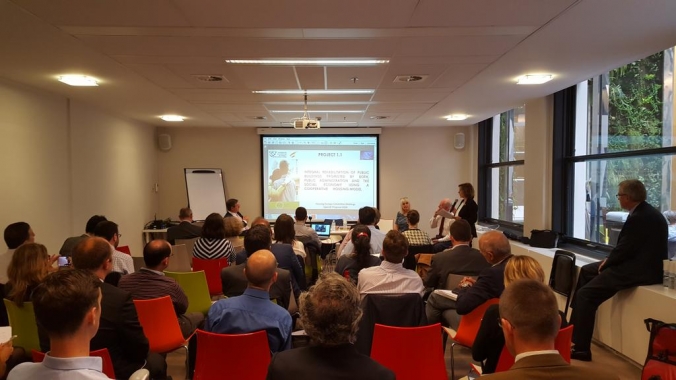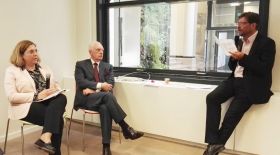EU invests in Social Housing: EIB loans in practice
Report from our half-day seminar
Brussels, 29 June 2016 | Published in Economy, Future of the EU & Housing
During the last meeting of the Economics, Finance and Internal Market Committee, Housing Europe organized a seminar on the role of EIB loans in the sector of social housing sector. The motivation to organize such an event was the fact that recently the European Investment Bank have been scaling up its support for housing. Recent loans for housing include €120 million to the Federal State of Brandenburg to deal with housing implications of the refugee influx, € 1 billion for the construction of new social housing in partnership with the Housing Finance Corporation in Britain, €400 million via the European Fund for Strategic Investment (EFSI) for Energy efficiency refurbishment in private residential buildings in France and €180 million to the municipality of Sweden for infrastructure investment including housing.
However, some issues remain open, for example the lack of clarity of EU state aid and deficit rules which slow down projects, the fact that some countries clearly are more successful than others. The lack of housing projects funded under the EFSI to date despite the EIB encouraging proposals from the sector also requires discussion.
The seminar gave therefore a chance to hear directly from representatives of the EIB, to get more details about approved loans but also to present initiatives in need of financing and get feedback. The event was also available throθgh live streaming.
The seminar was divided into three sessions:
The first session aimed at giving an update on the strategy of the EIB and recent projects. Gerry Muscat, Head of division Regional and Urban Development (EIB) gave an overview EIB as lending arm of the EU of the EU before communicating about the finance opportunities the EIB was offering. Gerry also highlighted the commitment of EIB towards housing investment (including new areas such as assisted living, student housing) and reminded that the Bank finances projects which are larger than 50 million euros.
To the question why some countries get more EIB support while others do not, the EIB reacted that they are providing with advisory help to the different countries (eg Advisory Hub) and the EIB has representations and intermediaries in all over Europe in order to give the most transparent information about the application process. Very importantly, the EIB recently started investing in new countries as well, such as Malta, Poland, Spain, Portugal and Ireland, and noted that other countries should follow.
Piers Williamson, CEO of Housing Finance Corporation in England (THFC) presented the recent loan that the organization is handling. He pointed out that THFC is a non-for profit finance company with the purpose of funding housing associations. In March 2015, the organization already lended altogether £5.09Bn (€6.4Bn) and will deliver up to £1.5Bn (€1.89Bn) of EIB lending under the UK wide Affordable Housing Guarantee Scheme.
Furthermore, Julien Garnier, Research officer at the Department of Loans and Housing, Caisse des Dépôts presented new resources from the EIB for Caisse des Dépôts social housing loans in France. Julien described in particular the € 2bn loan from the EIB for energy refurbishment, with a € 500 M envelope for social housing. Julien also highlighted the key elements of the savings fund of the Caisse des Dépôts which converts a part of households’ savings into long run or very long run loans (up to 40 years) defined by public policies, with a special attention given to social housing.
Lastly, Joao Carvalhosa, Director of CECODHAS Portugal presented the recent Portuguese programme called Rehabilitate to Rent. The loan is available for individuals and private companies. The condition to have the refurbishment loan is to rent the apartment after the works. The loan covers 90 % of the operations. Buildings accepted should be older than 30 years old, and should preferably be in Urban Rehabiliation areas. The conditions of work are fixed in municipal legislation which follows the historic protection rules of buildings.
Read MoreIn the second session the participants had been discussing new project ideas in Europe. Four countries gave a presentation about their ideas: Hungary, Spain, Albania and Scotland.
Project idea in Hungary, presented by Tamas Farkas
Tamas presented a scheme which was already completed in Hungary and was successful. There it could be a base of a future project. The aim of the scheme is the energy-efficient modernization of Co-operative apartment buildings (the apartments are owned by members of the Co-operatives).The modernization works would include window replacements, insulation and heating upgrade. The costs would be divided in three parts : one part would be paid by own resources of the houisng co-operatives ; the second part would be assured by Building society loans and the third part would be a Refurbishment loan. The EIB would finance 50 % of the project costs.
Project idea from Spain, presented by Raquel Lopez
Raquel presented two detailed ideas. The first project would aim the integral rehabilitation of public buildings using the cooperative model. The works would include Integral buildinrehabilitation, public area regeneration, buildability extension. The model could create direct jobs, ensure accomodation for youth, increase working population in the district. The secon project would aim the implementation of a network of houses in public land promoted by housing co-operatives. Housing for elderly could be an opportunity through this network. The works would include new constuction and public area regeneration.
Project idea from Albania, presented by Doris Andoni
Doris presented a project model for social housing implemented through a CEB loan, which was based on Local government ownership participating with local costs. However, due to several challenges faced with 8 participating municipalities with lack of experience and low capacities to manage the project, she proposed to simplify the project management through replacing the role of 8 Project Implementation Units (PIU) with that of the National Housing Agency (NHA). NHA has a long experience in addressing housing issues and managing housing projects. Moreover, it can also match funds with its own funds, or even consider being as a prime borrower to avoid the sovereign guaranty.
Project idea from Scotland, presented by Donald Lockhart
HARIS is a group of Scottish housing associations to try to deliver a sector vehicle ie of the sector and for the sector capable of securing borrowing at scale in order to be of interest to major financial institutions. It plans to do this by harnessing the development (ie the new build project management) and asset management capacity of the HA sector to aggregate funding needs and deliver significant benefits to the sector. HARIS would be an interesting partner for EIB, because it contributes to improving lives, creating jobs, benefitting local suppliers, cutting carbon and heating bills and achieving Procurement benefits.
Moreover, Marc Uhry, Head of European Affairs, from Fondation Abbé Pierre presented the ambitus idea of the Foundation to create a European Investment Fund on fuel poverty and social housing. Marc stressed the existence of high social needs in Europe and giving the example that today 37,4% of poor households are housing cost overburden, meaning that 22 million European households are cost overburden. Investing in fuel poverty and social housing is in line with the EU priorities because it would increase employment contribute to low-carbon economy and energy independence, would tackle public budget imbalances and would reduce inequalities and social exclusion.
Marc highlighted the efforts of his organization to set up a partnership in Europe because investments are channelled through big organizations. The Investment Fund idea would target the civil sector locally, but to make this happen, new discussions are needed with the European Commission.
The third session in the format of a round table discussion focused on the existing issues and propositions of potential solutions for housing associations moderated by Laurent Ghekiere (Head of Eu affairs, USH), with questions to the Gerry Muscat (Head of Regional and Urban Development, EIB), Gene Clayton (Chief Executive, The Iveagh Trust) and Judit Törökné Rózsa (Head of Unit Urban and Territorial development DG REGIO EU Commission).
The key takeaways from the panellists include the followings:
- All EIB project should harmonize with EU2020 priorities
- EIB finance considered as a loan, hence it is not State aid support
- For the EFSI support, the European Investment Advisory Hub is available to support with the preparation of potential EFSI projects ((http://www.eib.org/eiah/index.htm)
- The initiative of DR REGIO called Urban Innovative Actions will include housing in one of its future calls
- Combination of ESIF and EFSI: the European Commission prepared a guidance which is available for public access
